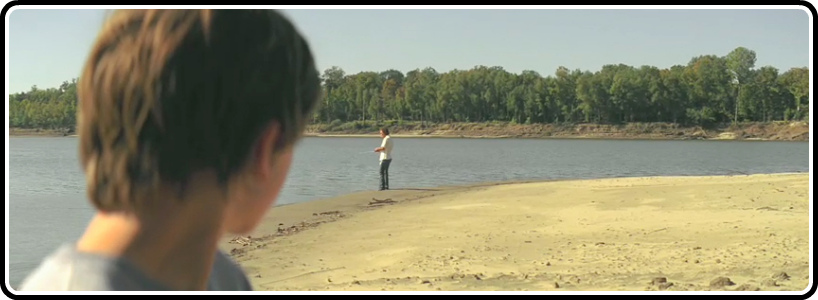
Jeff Nichols has risen through the ranks of the Hollywood system with the speed that was all too common in the 1990s, but which has been somewhat complicated in the 21st century. Making his feature debut with very few resources – save for some producing help in David Gordon Green and a somewhat-established actor in Michael Shannon – his Shotgun Stories is an exceptional first film, pointedly small in scale but rich in emotion and, most important to the context of this new film, folklore. The title referred to some wounds suffered by Shannon’s character, clearly the result of a shotgun blast, but the circumstances surrounding which can only be speculated or imagined by the residents of a small southern town. The limits of information are certainly of interest to Nichols – Take Shelter, his second feature, is essentially about a man who doesn’t even know what he knows – and Mud brings the idea of imagination filling out the inexplicable spaces in our lives to as ultimate a fruition as a man of Nichols’ grounded nature is likely to reach. And if I focus too much on a relatively minor tone in the film, this feeling of a certain folklore, it’s because little else in this movie is equally fulfilling.
Ellis (Tye Sheridan) and Neckbone (Jacob Lofland) are two young boys, barely into adolescence in an Arkansas riverside community, who discover not only an island pretty much all to themselves, but also a boat that’s somehow been lodged in a tree, the perfect hideaway for boys whose parents are separating and not at all present, respectively. That “all to themselves” part is quickly taken away from them when they discover a ragged man at the shore (Matthew McConaughey), whose friendly demeanor masks an inner fortitude that immediately affirms he’s not likely to share his newfound abode. Like most men one might find living in an abandoned boat on an island, Mud (as he is known) has a pretty dark past, one which the boys only catch glimpses of before understanding even an aspect of the truth. Nevertheless, he’s charmed by the boys, in no small part because they remind him of his own childhood, and becomes something of a father figure to them both in different ways, as they, Ellis in particular, slowly come to grips with the one real truth of life – nothing lasts.
There’s a structure to this film so firm and assured, one can only stand baffled at how uninteresting so much of it is. Nichols wrote a very good screenplay that he simply cannot see the virtue of all the way through, least of all in his direction, which is so free of the rigorous visual approach he brought to his prior two features that practically anyone could have made it. Shotgun Stories and Take Shelter were urgent works that seem to have sprung out of pure instinct; Mud is the work of habit.
Further undermining it is a distinct misappropriation of perspective. The first half of this film, at least, is told entirely from Ellis’ point-of-view; even Neckbone, for as many scenes as he gets, is mostly a supporting character. And then suddenly, without much real cause, Nichols departs from these kids, removing not only our anchor but also the film’s real strength in viewing a rather rote narrative through much younger eyes. The only thing accomplished in these departures is filling in some plot gaps, which extinguish all the mystery of the story with realities so mundane, their mundanity could not be an act of purpose. The characters are disposable, adding nothing of themselves and less to the themes and emotional current of the film, and shift away from what’s really important here, which is a slightly unconventional coming-of-age story, and a recognition that the disappoints of youth will be but the beginning.
This is powerful, potent stuff, timeless by its very nature and strengthened by Nichols’ unusual setting, with which he invests a great authenticity (or at least the semblance thereof). He gets some very good performances from a great cast – aside from the aforementioned principals, Reese Witherspoon, Sarah Paulson, Michael Shannon, Sam Shepherd, and Ray McKinnon have prominent roles – but he can’t find in his direction the tone so apparently rich in his screenplay. On the one hand, it’s a great example that a simple “illustrated text” a film does not make, but more dishearteningly, we’re left with a film unable to satisfy its considerable potential.



![Bergman Island (The Criterion Collection) [Blu-ray]](https://criterioncast.com/wp-content/uploads/2022/11/bergman-island-the-criterion-collection-blu-ray-400x496.jpg)
![This Is Not a Burial, It’s a Resurrection (The Criterion Collection) [Blu-ray]](https://criterioncast.com/wp-content/uploads/2022/11/this-is-not-a-burial-its-a-resurrection-the-criterion-collection-blu-ray-400x496.jpg)
![Lars von Trier's Europe Trilogy (The Criterion Collection) [The Element of Crime/Epidemic/Europa] [Blu-ray]](https://criterioncast.com/wp-content/uploads/2022/11/lars-von-triers-europe-trilogy-the-criterion-collection-the-element-of-400x496.jpg)
![Imitation of Life (The Criterion Collection) [Blu-ray]](https://criterioncast.com/wp-content/uploads/2022/11/imitation-of-life-the-criterion-collection-blu-ray-400x496.jpg)
![The Adventures of Baron Munchausen (The Criterion Collection) [4K UHD]](https://criterioncast.com/wp-content/uploads/2022/11/the-adventures-of-baron-munchausen-the-criterion-collection-4k-uhd-400x496.jpg)
![Cooley High [Criterion Collection] [Blu-ray] [1975]](https://criterioncast.com/wp-content/uploads/2022/11/cooley-high-criterion-collection-blu-ray-1975-400x496.jpg)
I thought I was the only one who thought this. Now I know I’m not crazy, as the hype machine rolls along. It’s not a bad film, just not as great as it so closely comes to be. The mystery of Mud is almost immediately defused and then you get this poor kid falling for the idea of pure love while his parents spiral down into divorce, which is constantly re-iterated. OK, we get it. Maybe it would have been better in French.